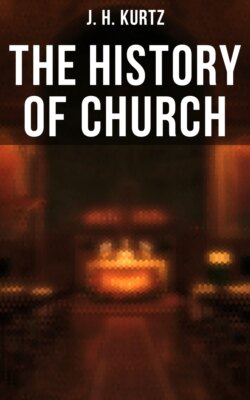Читать книгу The History of Church - J. H. Kurtz - Страница 25
На сайте Литреса книга снята с продажи.
ОглавлениеI. THE RELATIONSHIP OF EXTRA-CHRISTIAN PAGANISM AND JUDAISM TO THE CHURCH.21
Table of Contents
§ 21. The Spread of Christianity.
Amid all the persecutions which the church during this period had to suffer it spread with rapid strides throughout the whole Roman empire, and even far beyond its limits. Edessa, the capital of the kingdom of Osrhoëne in Mesopotamia, had, as early as A.D. 170, a Christian prince, named Abgar Bar Maanu, whose coins were the first to bear the sign of the cross. We find Christianity gaining a footing contemporaneously in Persia, Media, Bactria, and Parthia. In the third century we find traces of its presence in Armenia. Paul himself made his way into Arabia (Gal. i. 17). In the third century Origen received an invitation from a ἡγούμενος τῆς Ἀραβίας, who wished to receive information about Christianity. At another time he accepted a call from that country in order to settle an ecclesiastical dispute (§ 33, 6). From Alexandria, where Mark had exercised his ministry, the Christian faith spread out into other portions of Africa, into Cyrene and among the Coptic races, neighbouring upon the Egyptians properly so-called. The church of proconsular Africa, with Carthage for its capital, stood in close connection with Rome. Mauretania and Numidia had, even in the third century, so many churches, that Cyprian could bring together at Carthage a Synod of eighty-seven bishops. In Gaul there were several flourishing churches composed of colonies and teachers from Asia Minor, such as the churches of Lyons, Vienne, etc. At a later period seven missionary teachers of the Christian faith came out of Italy into Gaul, among whom was Dionysius, known as St. Denis, the founder of the church at Paris. The Roman colonies in the provinces of the Rhine and the Danube had several flourishing congregations as early as the third century.
The emptiness and corruption of paganism was the negative, the divine power of the gospel was the positive, means of this wonderful extension. This divine power was manifested in the zeal and self-denial of Christian teachers and missionaries (§ 34, 1), in the life and walk of Christians, in the brotherly love which they showed, in the steadfastness and confidence of their faith, and above all in the joyfulness with which they met the cruellest of deaths by martyrdom. The blood of the martyrs was the seed of the church, and it was not an unheard-of circumstance that the executioners of those Christian witnesses became their successors in the noble army of confessors.
